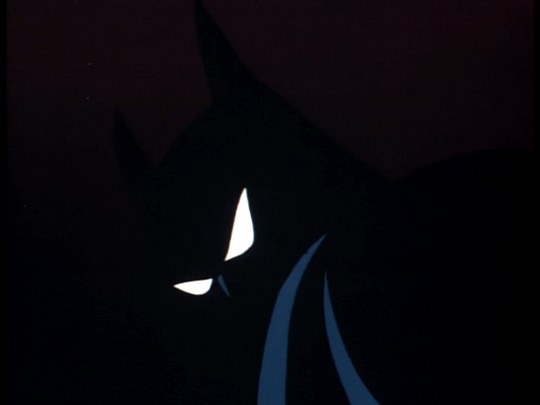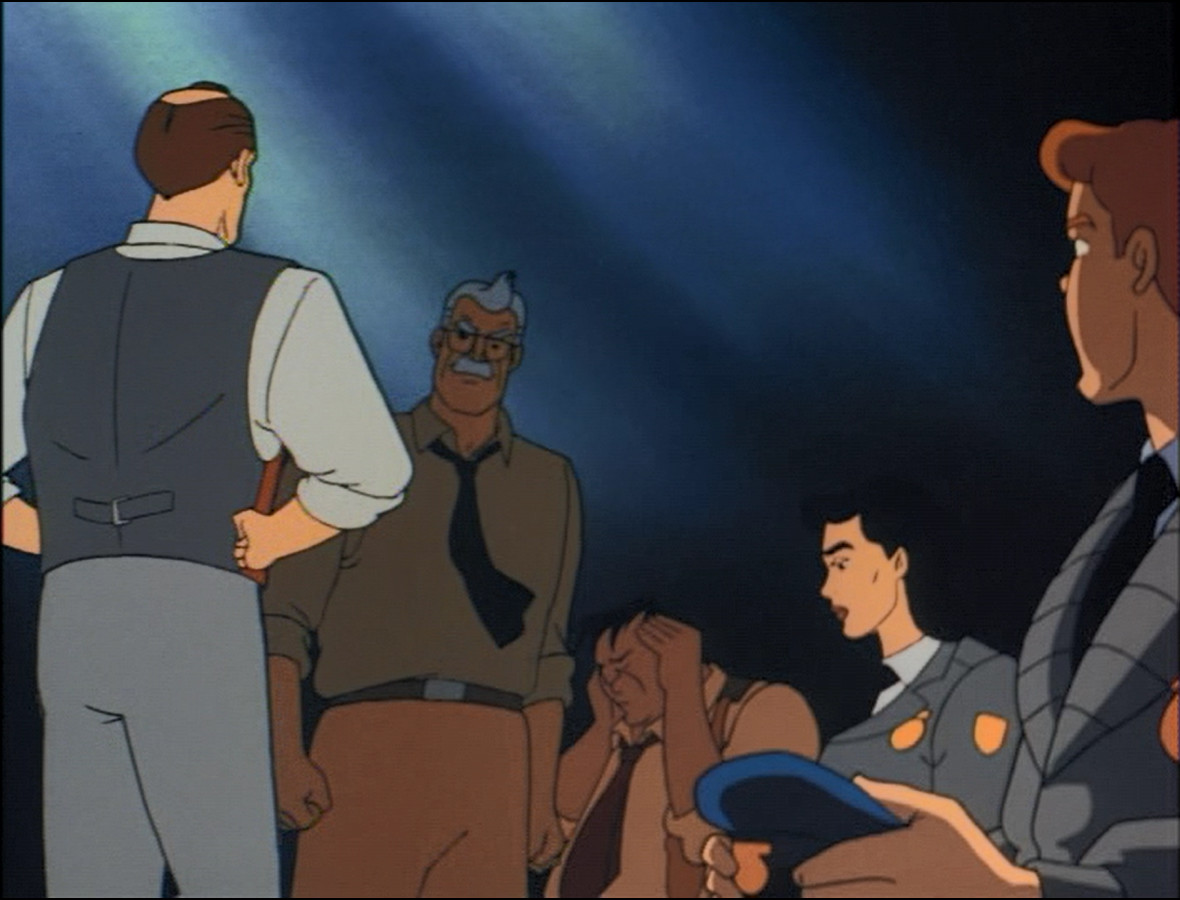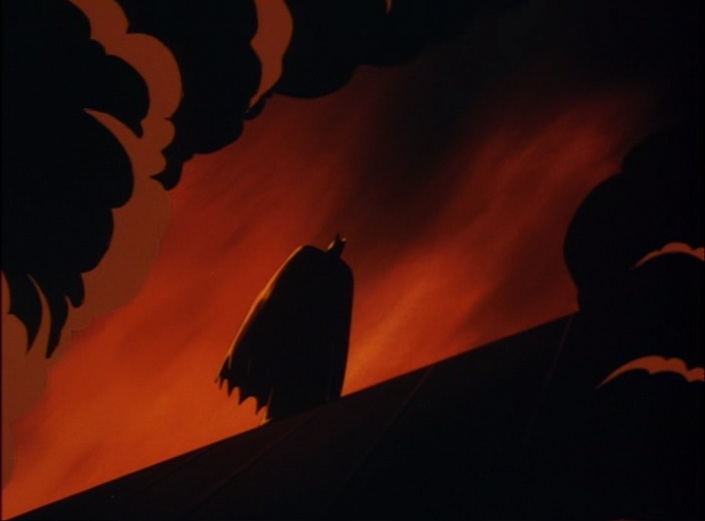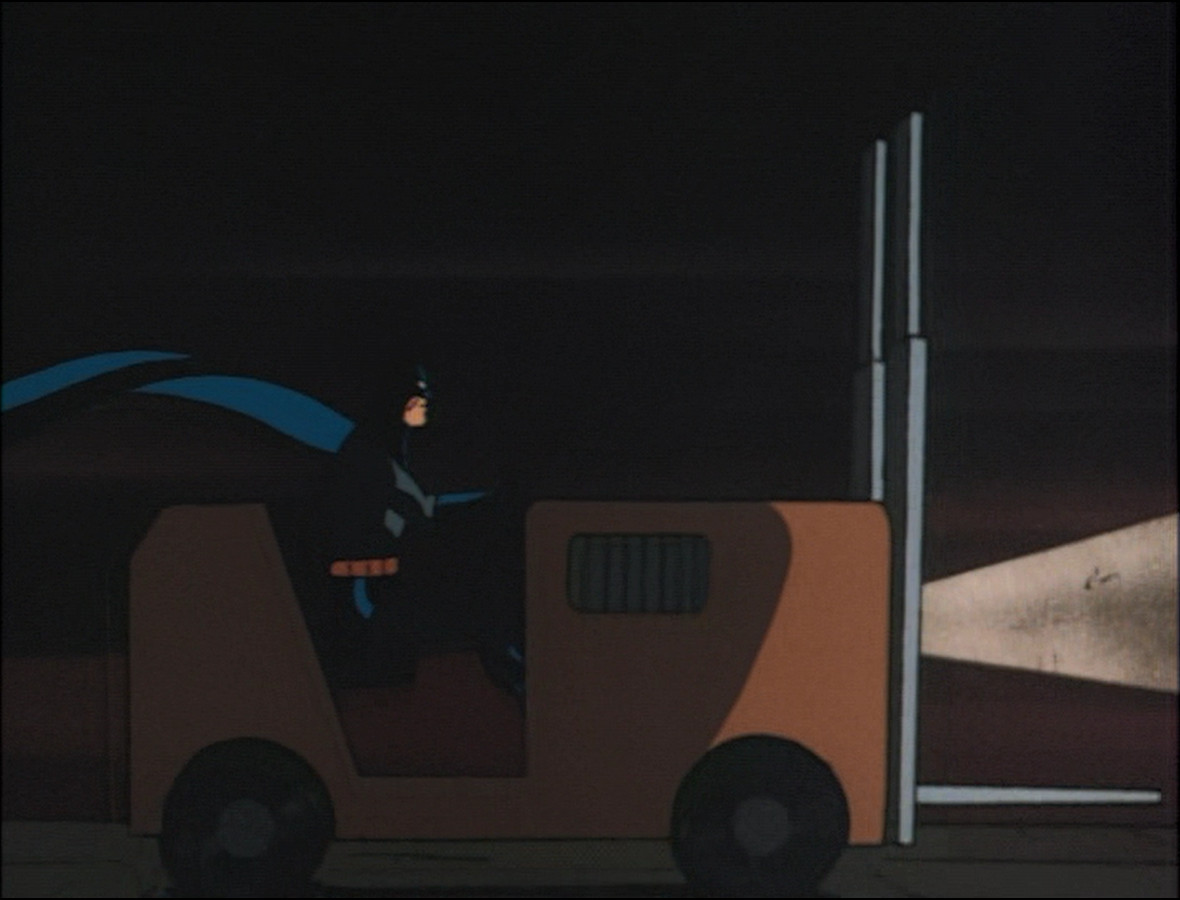P.O.V | BTASpectacular
Richard Petro / 11 September, 2017

- Airdate: September 18, 1992
- Director: Kevin Altieri
- Story By: Mitch Brian
- Writers: Sean Catherine Derek & Laren Bright
Renee Montoya and rookie Officer Wilkes make their way to back up Harvey Bullock at a warehouse. Arriving, they find the building on fire and Bullock outside in pain before being distracted by some thugs. Later, the three are being interrogated by Internal Affairs Lieutenant Hackle, blaming the three of them on the failure of a sting that has been in the works for months and the loss of $2 million. Each of the three take turns telling Hackle what exactly happened and how things went wrong. Bullock's story is mostly made up of lies and fibs while we see the truth. He immediately blames Batman, as well as the other two for apparently being late to arrive, which is why he went in alone. Inside, a noise, obviously must have been Batman, tips the criminals to Bullock and he is forced to deal with them before Batman shows up and starts a fire, which Harvey ends up saving the vigilante from. As he tells his story, the truth we see is that Bullock arrived at the warehouse early and entered right away without waiting. He trips and falls, alerting the thugs himself and being forced to fight them off outnumbered, which eventually leads to the fire starting. Batman shows up and helps Bullock, eventually grabbing him and rescuing him from the fire. Officer Wilkes' story is one of wonder. He had never seen The Bat before, just heard all the stories that float around. Montoya enters the warehouse as Wilkes ends up in pursuit of a couple of thugs. They get the jump on him, but he is saved by Batman, who uses his mythical and legendary ways to discard of the thugs, though we see that it is Batman using his normal gadgets. Montoya says they were on time arriving and Bullock was already down and out when they got there. Entering the warehouse, the shotgun she carries gets knocked from her hands before she could fully apprehend those still inside. One of the thugs approaches her with a giant drill but Batman intervenes. Montoya again doesn't get a chance to apprehend the criminals as the roof caves in and Batman rescues her, pushing her out of the way and being buried himself. Hackle suspends the three and demands they turn in their guns and badges. On the train home, Montoya realizes that a word she heard one of the thugs say wasn't the name of a person, but a location. She makes her way to the docks and enters a warehouse there, seeing Batman tied up by his hands. He talks the gangsters into revealing information before breaking free and, with Montoya joining him, fights them off. The two are able to apprehend the thugs, as well as the leader known as 'The Boss'. The $2 million Hackle was angry about earlier is recovered, though Hackle himself is now angry about the fact that Montoya worked without orders. Gordon, fed up, takes the badges of the three officers from Hackle and tells him off, throwing him to the side, before handing the three their badges back, reinstating them.
 I love episodes like this. Batman is someone who is a great character to focus on, of course, but he also lends himself really well to being a 'background player.' Having every day, normal citizens of Gotham City telling their stories of encounters that involve Batman is always incredibly entertaining to me, and it is capitalized to great effect here. Not only do we get three different kinds of viewpoints and attitudes towards The Bat but it also does a great job using the stories to build the characters of those involved, most specifically Montoya and Bullock.
I love episodes like this. Batman is someone who is a great character to focus on, of course, but he also lends himself really well to being a 'background player.' Having every day, normal citizens of Gotham City telling their stories of encounters that involve Batman is always incredibly entertaining to me, and it is capitalized to great effect here. Not only do we get three different kinds of viewpoints and attitudes towards The Bat but it also does a great job using the stories to build the characters of those involved, most specifically Montoya and Bullock.
The structuring of the stories here is integrated well in how they cut from the flashbacks to the now, and the fact that we get an entire final act that doesn't involve the opening premise is great. There's a lot packed into these 22-minutes and not once does the episode feel overstuffed or rushed. It doesn't leave you with a sense of wanting more or feeling as though they weren't able to capitalize on the idea properly. It also helps that they are still able to fill the episode with its usual sense of humour.
The choice of having Bullock's side of the story first was a smart one, as we are already familiar with his personality enough to know what kind of tale he will tell. The juxtaposition of his words and the images, which tell the truth, is hilarious. Bullock, though reckless and self-important, has always been a character I really liked in this series, and it's a testament to the writers that they were able to balance his pig-headedness with a level of sincerity. Because of the lies of Bullock's words counterbalanced by the truth that we see, Bullock's portion of the story is where the majority of the episodes humour comes from. Mentioning that the gangsters must have heard a noise that tipped them off on his presence as we see him trip and fall on something right within eyesight is something that always makes me laugh. We are treated to another humorous moment in this vain when he mentions that he was luckily there to save Batman, his words coming out while we watch Batman rescue him from the burning building. While we do get laughs from Bullock essentially sabotaging himself, he is still treated in a way that makes us respect him. He gets a few short but great moments here, like the moment where, once discovered, he openly challenges the three mobsters to a fight by himself. He may be full of himself but the man is definitely someone who can still back himself up. It shows us just why Commissioner Gordon usually relies on him more than anyone else. Bullock is a pain to put up with most of the time but he is also someone who will always be there to do the job the best he can no matter what. Just like they do with making him likable even through his put-on personality, the writers also succeed in making him someone who still garners his dignity and our respect even when he messes up bad.
Rookie Wilkes' story is an absolute joy. It reminds me of the 'Legends of the Dark Knight' episode from The New Batman Adventures, which revolves around a group of kids discussing what they think The Batman is actually like. Wilkes' wide-eyed, child-like wonder at everything Batman does, even describing his usual methods and gadgets he uses in a somewhat fantastical tone, is, in many ways, adorable. He is absolutely stricken by the first face-to-face interaction he has with The Caped Crusader, and the way he views The Batman is not only a great counterpoint to Bullock, but a wonderful look into what a lot of people in Gotham may see Gotham's mysterious vigilante as. He is a mythical being that arrives not just from the dark, but almost from thin air. He is almost inhuman with how prepared he is for any situation and how quickly he can deal with them. He seems to be everywhere at once as he has a major impact on all three simultaneous stories. He's stronger than strong, has unbelievable powers, and has eyes all over Gotham in ways that don't seem possible. The Batman in Wilkes' story is the Batman that Bruce Wayne always strived to be from the point-of-view of everyday citizens. Criminals believe things about Batman the same way Wilkes does and they're terrified of every corner and shadow in the city. Citizens, ones that are pro-Batman at least, are just like Wilkes in seeing and imagining Batman as an awe-inspiring figure that is capable of unimaginable things. Villains can expect Batman to show up and deal with them. Citizens can expect Batman to show up and help them. The difference between Bullock's and Wilkes' story is one that always makes me laugh. It's not something funny that's blatant or at the forefront, and one that is underlying to the way they're stories are vastly different in how they view the Caped Crusader. Wilkes' is filled with giddy-wonder, saying that he has never had any interactions with the Batman and had only heard stories. This moment is pivotal for him, maybe even life changing. Bullock, meanwhile, having had interactions with Batman and thinking of him as nothing more than a nuisance treats the Dark Knight with what could be described as a groan and a "this guy again?" Bullock's indifference is hilarious when compared to the fact that you can just feel that Wilkes desperately wants to get up from his seat and act out everything Batman did.
Renee Montoya's story is the most straight-forward, professional and dealing with the truth. This doesn't make her story any lesser than the other two. It perfectly sets up Montoya as a character, someone who only had a passing, one line appearance in Pretty Poison prior to this. She is dedicated, hard-working and head strong. Her story also builds her character in ways that show her personality and not just how she is as an officer; she defends the actions of herself and Batman while also making sure to throw in a few tongue-in-cheek subtle jabs at Bullock and his story. While we do get more time with her in the final act, the way she handles herself in telling her story to a man obviously out to blame anyone no matter what shows us just how important she will be to Gordon down the line. She is a great counter to Bullock, while also being very much like him in dedication. In just a few minutes, Renee is allowed to make her mark as someone who is one of the most important additions to the supporting cast in terms of 'normal', non-disguised individuals in Gotham. This is expanded upon in the final act we get, with Montoya making her way to the harbor to investigate things herself. I love that we see her as being very street smart as well, knowing how to pick a lock easily, and she is also able to fend for herself against thugs, not having to rely on Batman to do his Batman-ing, going so far as capturing The Boss. Seeing her and Batman against others is a joy as well, since it's always fun to see him teaming up with people that don't also fall into the 'superhero' category.
Speaking of Batman, the supporting cast here is also incredibly well used in such a short amount of time. Just like how the plot is able to put in a lot of detail while also never seeming like it's rushing or there's too much going on, all the characters are properly handled and given their moment to shine.
The titular character, besides being just more of a background character, also has the least number of lines he may have in any episode from the series. He is more of a presence here, falling in line with his depiction in Wilkes' story more than anything. He shows up, does his business, and moves on. We see him getting his fair share of Batman on here, not just in the separate stories, but also in the final act. Batman beating up thugs while still in handcuffs is the epitome of being so awesome while also being simple. It's not some ridiculous, over-the-top thing they have the character do, but him fighting off a group of armed baddies with his hands tied together is just as, if not more, effective than anything else could have been.
Also, Batman drives a forklift in this and it's absolutely glorious and worth watching the episode for alone. We are also treated to this shot, which easily falls under the 'shots-I'd-love-on-my-wall' category.

While Hackle is very, very easily made to be severely unlikable here in his ego and the way he throws around his authority, Gordon is given chances to really stand out in the background as well. He stands by those that work for him through thick and thin, getting irritated to the point of not only talking down Hackle at the end, but tossing him to the side. Gordon knows his people and is a good judge of character. If he says that these are good people who aren't worth the treatment they're getting, he means it, always backing up those people himself.
Along with the shot of Batman on the burning rooftop above, there are a few other shots that need to be pointed out. In Bullock's story there is a moment where, as he enters the building, the shadow of Batman's head pops into frame across the door… hanging upside-down. It's a wonderful shot executed perfectly, the simple decision to have it wash across the screen upside down being immediately striking and standing out. The entire episode has a fantastic use of shadows, with shadows creating moods (like always) and washing across gangsters faces, making them incredibly sinister. There is a moment in Renee's story where a thug approaches her with a giant drill and we get a close-up of his face which is really unnerving. There's also a masterful transition here. After Hackle tells the three to turn over their guns and badges, we get a zoom in on the pieces laid out on the desk, before the screens darkens, leaving only one of the badges visibly and, finally, fading fully into black. The Animated Series is made up of many moments and shots like these, ones that make it worthy of some of the greatest film noirs in its execution.
 Are there any negatives? There is one that is kind of a big blunder in terms of storytelling. Stories like this are usually about entertaining the idea of 'which story could be the truth or how much of each story is the truth'. The problem here is obvious... we know Bullock is lying. Not only that, by proxy, Hackle is right to feel that the sting ended up getting ruined, since Bullock was responsible for it. The issues then becomes the fact that we don't just know Bullock is lying, but he isn't punished for his actions.
This could have easily been dealt with by tweaking Bullock's story, maybe make him accidentally early and he doesn't realize it. Anything. But that has never really impacted what I think of the episode, as I think it's still really enjoyable for multitudes of reasons. I've seen some people dedicate paragraphs to this plot point and its blunder but, eh, I still find myself easily shrugging it off and enjoying it.
Are there any negatives? There is one that is kind of a big blunder in terms of storytelling. Stories like this are usually about entertaining the idea of 'which story could be the truth or how much of each story is the truth'. The problem here is obvious... we know Bullock is lying. Not only that, by proxy, Hackle is right to feel that the sting ended up getting ruined, since Bullock was responsible for it. The issues then becomes the fact that we don't just know Bullock is lying, but he isn't punished for his actions.
This could have easily been dealt with by tweaking Bullock's story, maybe make him accidentally early and he doesn't realize it. Anything. But that has never really impacted what I think of the episode, as I think it's still really enjoyable for multitudes of reasons. I've seen some people dedicate paragraphs to this plot point and its blunder but, eh, I still find myself easily shrugging it off and enjoying it.
P.O.V is a good episode with, depending on how you may be, a big plot problem for what it's trying to accomplish that may or may not ruin your overall experience. But I still feel it gets overlooked in discussions of enjoyable episodes in the series and is worth revisiting if you haven't seen it in a while or don't remember it much.
Also, we get a great shot near the end of Batman, hand on his hip, scratching his head. Like the forklift shot, it's glorious.
Great Lines and Moments Bullock: "I was closing in when this loud noise tipped 'em." (he trips and falls over a can by his feet) Bullock: "Must've been Batman!" ----------- Montoya: "I thought you were…" Batman: "Not while there's unfinished business."


